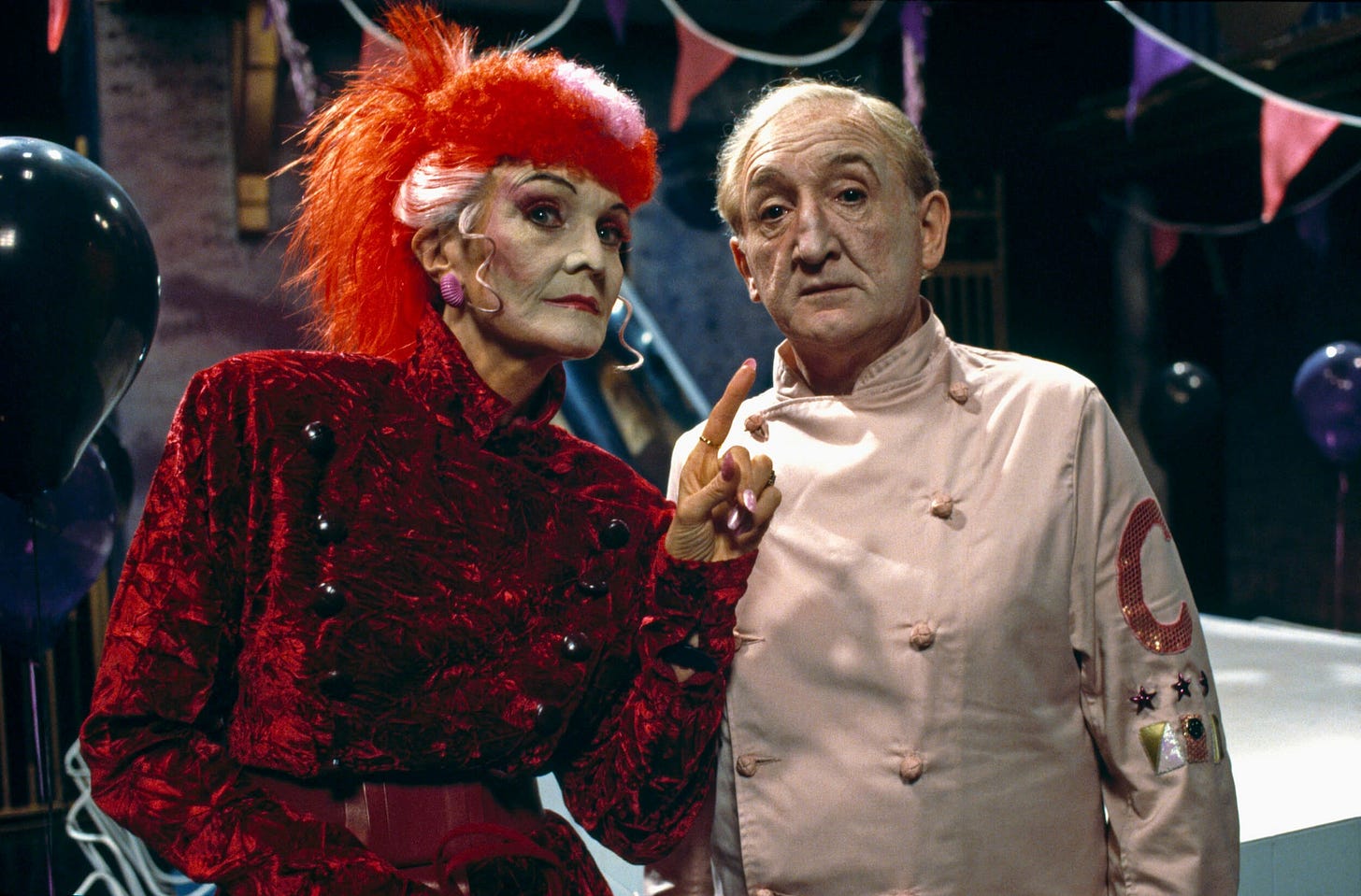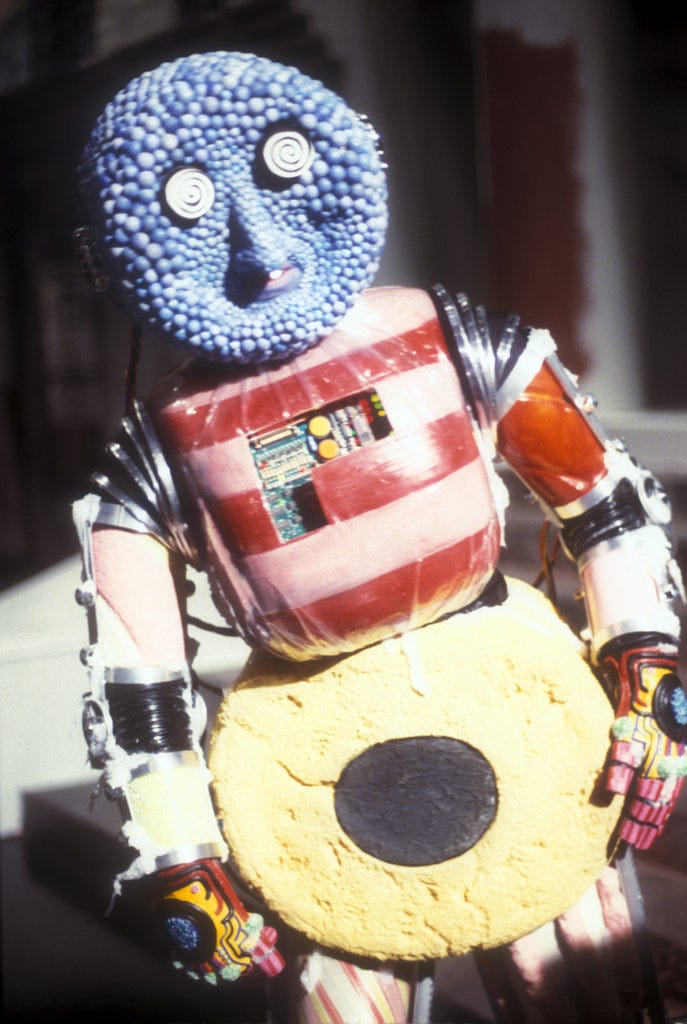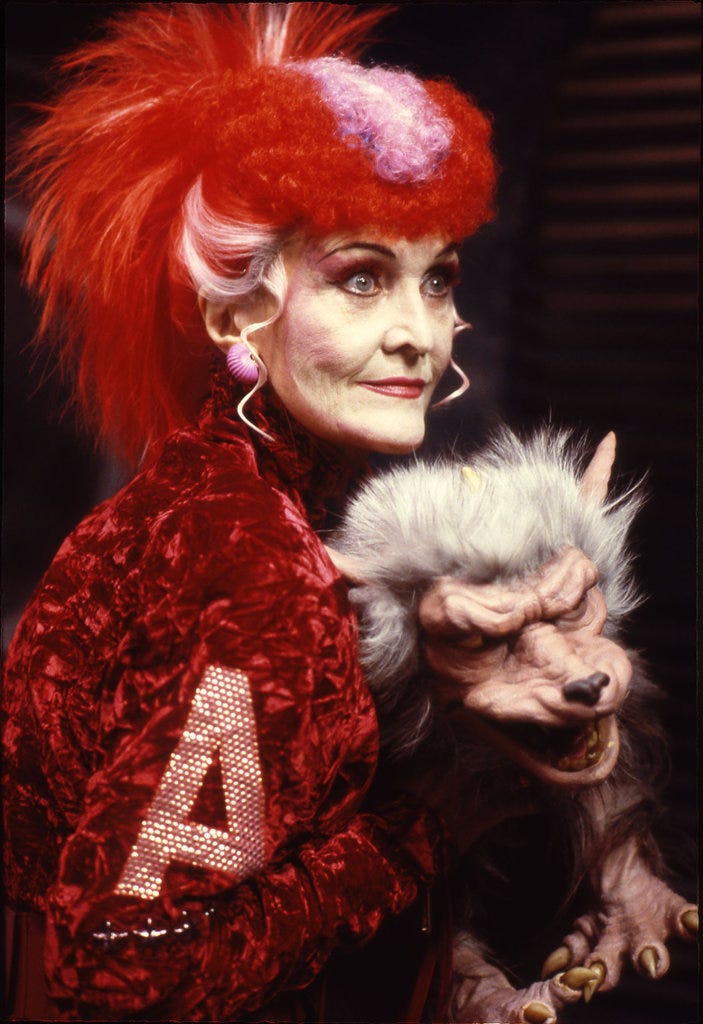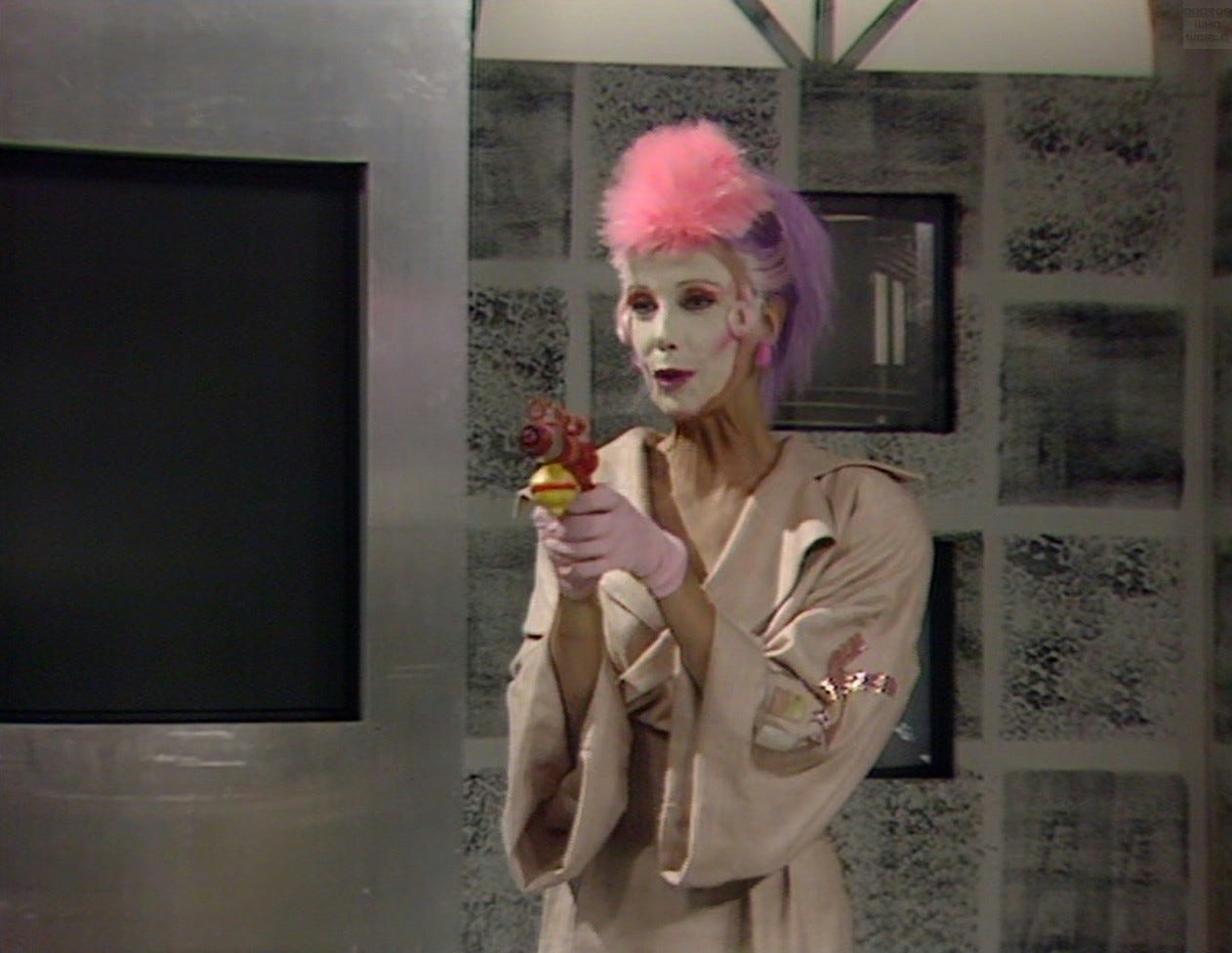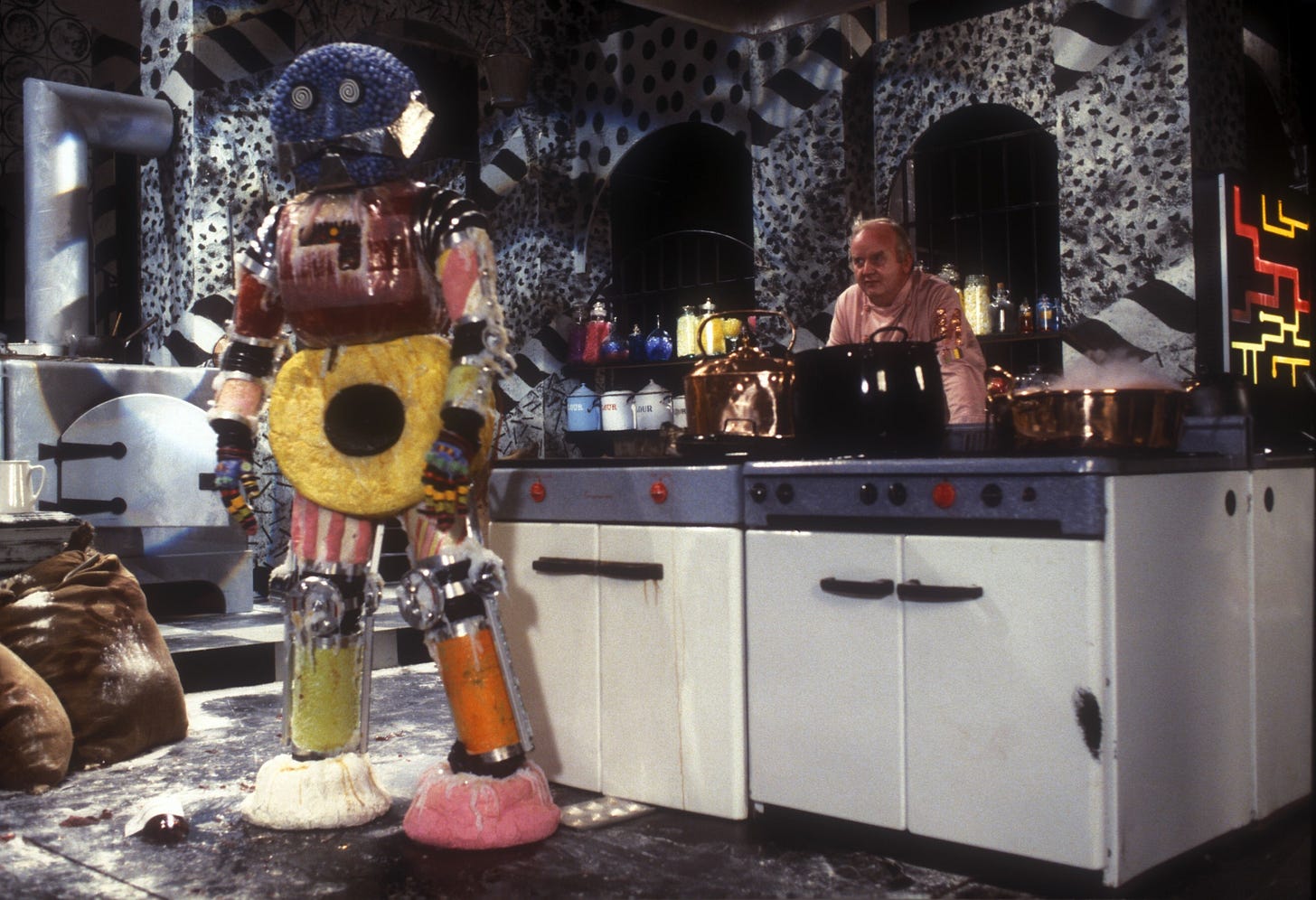Sugar, Spice, and Authoritarian Regimes: Doctor Who’s Wildest Political Satire
The Happiness Patrol is a Barbiecore dystopia that takes aim at Margaret Thatcher, but has themes that go far beyond its '80s politics.
Plot Summary
The Doctor and Ace arrive on an Earth colony where a merciless autocrat has mandated happiness, enforced by a sadistic executioner made of candy.
Notable for:
Production team considered this for black-and-white to emphasize the film noir atmosphere
Sheila Hancock played Helen A intentionally as a caricature of Margaret Thatcher, whom she detested. Graeme Curry denies it was supposed to be a direct satire of her, but he has said it was “probably in the back of my mind.” Years later, McCoy and director Chris Clough said the production team deliberately ran with the idea.
Curry originally envisioned the Kandy Man as more human in appearance, with powdery skin and a lab coat. This version is described in the Target novel.
Special Edition on the Blu-ray adds back several cut scenes, plus has improved effects, mostly conveying the scale of Terra Alpha with cityscape pans, and many more signs/murals in the background (some faded).
Pete commentary:
General:
The Happiness Patrol makes a solid case for being the epitome of the show’s reach exceeding its grasp. Lots of ambition here to tell an epic story of the Doctor bringing down a tyrannical government in one night. There are deliberate choices of style (film noir), theme (its not-as-obvious-as-you’ve-heard politics), and scale (human colony on an alien world, with factories, a theater, eerie streets). It’s really ambitious, but it’s limited by the realities of TV production and Doctor Who in particular at the time.
It really should have been four episodes! So much was cut, and some of the scenes I think are crucial at bridging part of the plot. Including:
Ace and Susan Q have a moment while walking after she’s captured that establishes their fondness of each other, and Susan Q’s rebellious nature. In the transmitted version they’re suddenly buddies for no reason.
There is a fantastic exchange between Daisy K and Helen A about the Doctor escaping—another tour de force from Hancock.
The Kandy Man has a much better entrance, scaring away Trevor Sigma and cutting off his own thumb.
Four episodes would have let them flesh out the pipe people more. As is, they’re fairly extraneous, and honestly a bit laughable. They’re like a cross between Bellal from Death to the Daleks and the Ewoks, but in both of those cases you get a lot more. The Pipe People are super forgettable.
They honestly might still have been forgettable. A better use of an extra episode would probably be introducing a drone character to give more dimension to the protesters that Earl Sigma recruits.
The film noir stuff is there, especially with Earl Sigma’s scenes. But the limits of the TV budget and standards meant that a ton of stuff was overlit, such as Helen A’s office, the waiting zone, and others. I don’t mind the Kandy Kitchen being lit up, since that’s supposed to be sweet and OTT. But generally it would have been great to do more with the idea.
That go-kart, though—oy. The buggies in airports would be better escape vehicles. The Happiness Patrol jeep isn’t much better. Shame there was no budget for location shooting at all.
Makes good use of music. Having the harmonica and the blues serve as the banner for the drone protest is great symbolism. I think it would have been better to have the Muzak punctuate more of the Helen A scenes.
Camp!
Similar to Delta and the Bannermen, this is an example of the McCoy era dealing with its limited resources by leaning hard into camp, playing up iconography and OTT performances to the point where it hopes you’ll overlook how dodgy the whole thing looks. Some of this works—Helen A and the Kandy Man—while other aspects fall short (the Happiness Patrol themselves don’t look cheery or menacing enough).
There’s some nice setup when the Doctor and Ace are talking, and she mentions she hates muzak. You start to wonder why they have muzak at all, and then the Happiness Patrol shows up, with their cheerleader outfits. It’s all a veneer over something sinister, clearly. Even if you didn’t have the first scene with the execution, you know something bad is happening here.
The Kandy Man
The Kandy Man is great. Even though the entire idea is totally nuts: The Kandy Man is some kind of construct, created by Gilbert M, built out of an actual person (he says he brought the Kandy Man’s bones in a suitcase) and a mix of confectionaries? Whatever, dude. The novelization fills in a little more of the gaps, but it’s still a bit glossed over. David Pope really nails the performance, though—a Joker-type executioner who delights in killing people with sweets. He’s quite literally a visual treat, and his overt menace definitely makes an impression on kids.
They clearly spent a good deal of the budget on the Kandy Man and the Kandy Kitchen, so it’s a shame he doesn’t get to kill anyone outside of the hapless guy at the beginning. He kinda-sorta does something to Earl Sigma, but he seems to recover almost right away. He also gets bested by the Doctor via the same trick twice. The Kandy Man could have, and should have, been more formidable—another reason to make the story four episodes.
LOVE how he answers the phone: “Kandy Man.”
Fifi doesn’t work quite as well. It’s better than other effects, but the story seems to kill it off, bring it back
Helen A and Terra Alpha
The whole rationale of Helen A’s regime is a superb idea: A totalitarian government that enforces its regime by insisting that everybody be happy. You get it, and you get how that could be an underlying, almost religious philosophy, and how so many people could be coerced to go along with it. There are clear advantages for a lucky few (the Happiness Patrol) and harsh consequences for everyone else, but there is a seemingly democratic system of the auditions. It’s a little Hunger Games—you see Donald Sutherland’s logic in what Helen A is doing: giving the people a sliver of hope to keep them all repressed.
That said, the enforcement of this is pretty confused. The Happiness Patrol shoot Silas P almost on sight the moment he seems to be just slightly glum. There are several other points where you’d think they would shoot others (Ace in the waiting zone, for one) for the exact same reason, but they don’t. Are the rules really this arbitrary? Or did Daisy K shoot him out of jealousy (he was just “knighted” by Helen A, after all)? But if the rules really are that arbitrary, the Doctor’s defense at the auditions shouldn’t have worked.
In other words, I wish they had explained a little more about how the ground-level enforcement of happiness works—what are the rules the Happiness Patrol must abide by? That would have given the audience more to work with in various scenes, and let us get nervous when someone like Earl Sigma or Ace starts to go outside of them.
“There are no prisons on Terra Alpha.” Great line, because of what it implies. It’s exactly the kind of thing a regime like Helen A’s would brag about as evidence of how nice the place is. But the implication is that all prisoners are either freed or, well, “disappeared.”
You can headcanon the confusion in an effective way by reminding yourself that this is an empire on the verge of collapse. Its own internal logic is beginning to break down as everybody starts questioning what the point of everything is. The woman at the beginning is the strongest indicator that Terra Alpha is at the precipice of revolution. The Doctor is only here to give it a shove.
One more thing that would have given this more resonance or believability: more backstory. Why would the people of this colony submit themselves to the tyrannical rule of Helen A? What happened? You want to hear just a little bit about how they got here, just to understand why they turned to someone who would force everyone to be happy (something unbelievably tragic, perhaps?).
The Politics
This is certainly one of the more overtly political episodes of Doctor Who, and it gives a good amount to chew on. There’s the criticism of Margaret Thatcher, which is obvious, though the actual policies of Helen A—execution squads, thought policing, labor camps making sweets—are clearly in another universe. It’s a great satiric performance, but it’s a bit hollow: a delicious candy shell surrounding bland, empty calories.
The one thing that might be more tangible is the thinly veiled (and arguably thin) LGBTQ+ commentary. The fondant surprise execution of the man in episode one, where he’s killed for expressing public grief, could be seen as this regime’s cruel punishment for “coming out” as unhappy. There’s also Helen A’s declaration that, “Families are very important for people's happiness,” a fun-house mirror twist on a central conservative philosophy often used to push traditional family structures.
If that’s where they were going, though, it’s a bit confused. Helen A’s regime is all about gaudy decor, camp, and emphasizing happiness, and the word “gay” literally means happy. It kind of feels pro-gay, tbh. Is it appropriation? Maybe. It’s more appropriation of emotions (facile happiness masking misery) than anything gay, though. There’s also the bit where Gilbert M and Joseph C run off together, which could have been more pointed one way or the other if they’d bothered to develop it more.
Some have said the Kandy Man is some kind of avatar for capitalism, and given he’s all about manufactured sweets, branding, and artificial pleasure, it’s perhaps understandable. But the analogy is purely surface level: There’s zero mention of any kind of economy or private enterprise on Terra Alpha. In fact, the Kandy Man is clearly an agent of the state, enforcing government rule. Everything the Kandy Man and Helen A stand for is a fascist, authoritarian state with more government control, not less. It’s totally incompatible with markets, deregulation, private property, etc.
All the anti-Thatcher stuff here would seem to date the episode, but The Happiness Patrol has a more timeless message: That the authoritarian structures that force people deny their own feelings (and possibly even reality) will eventually collapse under the weight of their own contradictions.
The Happiness Patrol also offers a good road map/game plan for thought policing. Success depends on:
A central ideology that sounds good on the surface (“Happiness will prevail”)
An enormous propaganda campaign (Helen A’s continual broadcasts)
Rewards for those who go along (sweets and safety for most, membership in the Happiness Patrol for a few)
Punishments for those who don’t (execution by fun gun, the Kandy Man, or the auditions).
John Kenneth Muir in his 1999 book, A Critical History of Doctor Who on Television, saw parallels with what was then called “political correctness,” and I’d argue they resonate even more in the era of outrage mobs and cancel culture, which similarly are all about control, conformity, and suppression of protest. Instead of a government demanding smiling loyalty, online communities and institutions can demand ideological conformity. Cross, or even question, the orthodoxy and you will be mercilessly punished.
Of course, we’ve passed the peak of that era and are entering something new, which arguably confirms that all authoritarian regimes eventually collapse. But what’s beyond the scope of The Happiness Patrol is that what comes after isn't necessarily a “happy” ending. The message still applies because tools of control are not inherently right-wing or left-wing—they are human impulses that attach themselves to whichever ideology is ascendant. The danger is mistaking dominance for moral justification.
Misc
Great “Doctor” moment: the Doctor talking the snipers out of doing their job. Again, more indication that the regime is collapsing: these “soldiers” (they seem more like bored security guards) are already questioning their role, and the Doctor gets them to rethink what they’re doing by forcing them to kill up close. Beautifully written, and very emblematic of the show.
I don’t know if this is the best episode for Ace. She starts strong, wanting to make the bad guys “very, very unhappy,” but then Ace is captured and recaptured multiple times, without doing too much in between. The story is intent on having her end up at the Happiness Patrol auditions, but that’s the cliffhanger to episode 2 (and a great cliffhanger it is!), so everything up to that is kind of a pickle ball match. She doesn’t even get to properly kill Fifi with the nitro-nine.
Why does Earl Sigma save the Doctor in ep 1?
What did Pete’s family think?
Grace wisely said, “You can’t be happy without being sad,” after episode 2. She enjoyed it, thought it was different, and was into the Kandy Man. She really liked the Special Edition, with the new city views of Terra Alpha.
Four Questions to Doomsday - Pete
Why did the Randomizer take us here? The Doctor makes direct reference to Invasion of the Dinosaurs as soon as they arrive in Terra Alpha. Also, the Doctor connects with Richard Nixon in TIA/DotM, and here he’s confronting a Thatcher stand-in. It’s also an interesting contrast in general with “the Doctor reacts” format of Doctor Who—here he’s being very deliberate about what he’s doing.
What if the evil plot had succeeded? I shudder to think. Helen A’s regime exists on top of the emotional equivalent of ethnic cleansing. She’s obsessed with eradicating all unhappiness, and with more tools at her disposal, she could take things to another level. I could envision a Circle-like escalation in what she does to actually read people’s thoughts to find who really is happy and who isn’t, or even “deprogramming” sadness and unhappiness from the human brain by force. We’re already doing 1984 for kids here, so it’s not too difficult to go into something more adult.
How would that happen? I would focus on the Doctor saving Ace at the auditions as the turning point. It doesn’t work, and they take him prisoner. Ace dies, the Doctor is taken back to the Kandy Kitchen, where the Kandy Man executes him again and again.
But again, it’s hard to see the evil plot succeeding because Helen A’s regime seems to be on its last legs. Trevor Sigma is an indicator of this: He was tasked with gathering the names, not of the citizens of Terra Alpha, but of everyone who’s disappeared. It appears to signal that Galactic Centre has its own suspicions of what Helen A is up to.
Where's the Clara splinter? She’s Susan Q! Perfectly aligns with Clara’s character, and the Doctor wouldn’t recognize her years later without all that white makeup. Also, her name’s Susan—want to ask if she’s your granddaughter, Doctor?
Dalek, Ogron, Professor Hayter, Viscount Banger, Fixed Point in Time, Lady Cassandra, or Zarbi? Pink Dalek: solid Doctor Who, and emblematic of the show in so many ways: “Let’s go for it,” despite having only $5, with a strong Doctor, great monster, and excellent guest cast. It’s more political than most, but by making it less direct (apart from the Thatcher impersonation), you get something interpretable. Darker than most, but you leave it with confidence.
Chris commentary:
Very of its era – Watchmen smiley face with blood, Amusing Ourselves to Death, maybe King of Comedy, maybe even I'd argue They Live! – trying to smile through it, the connection of smiling and comedians and heading towards a certain sense of capitalistic doom.
Gordon Bennett! (History corner?) Likely derived from James Gordon Bennett, a Scot who emigrated and made it big in American media. Basically the 19th century Logan Roy (Succession).
Took me a while to realize Helen A is the first among equals, that the society is stratified by letter. How does that work, then? (Also, makes it very easy if the space slugs from Dot and Bubble come to eat all the Terra Alpha elite, and why wouldn't they? They're kinda right-wing and extra sugary!)
Love that Helen A is just a straight-up Thatcher parody, in the sense that everyone involved just casually admits that was the intent. Hate that it doesn't really lean in to being a Thatcher parody, even with Sheila Hancock doing the voice. Not until the very last speech do you get the connection.
Not very effective an attack on Thatcher … but isn't it weird that Doctor Who would be taken off the air almost one year on from the broadcast of this story … and almost exactly two years on, Thatcher herself would be ousted! Spooky … is Doctor Who like a space bee that stung Thatcher? Is 1990 where the Doctor learned the devastating line "doesn't she look tired?"
God, it would be amazing to see this with a budget. Or on film. Or with better audio. Or with just a few better casting decisions, like the guy playing Earl.
Did we really need the Theta Sigma callback?
Why are aliens called Sigma anyway?
Did we need the pipe people?
The actual evil plot is DARK: "we have controlled the population by 17%." That's a genocide!
Cannot believe bloody Bassetts went and narked on bloody Doctor Who. Yes, it's an obvious Bertie Bassett copy. But HOW many jelly babies did Tom Baker sell for them in the 70s? When you couldn't get advertising on the BBC for love nor money?
Four Questions to Doomsday - Chris
Why did the Randomizer take us here? PET DEATH TRIGGER WARNING. Dino discussion. The "is Who too political" discussion. Just been watching SEVERANCE: Helly R!.
What if the evil plot had succeeded? Terra Alpha becomes the Galactic Center of the blues.
Where's the Clara splinter? Teaching Earl how to play harmonica?
Dalek, Ogron, Professor Hayter, Viscount Banger, Fixed Point in Time, Lady Cassandra, or Zarbi? Could it be … a Viscount Zarbi?


